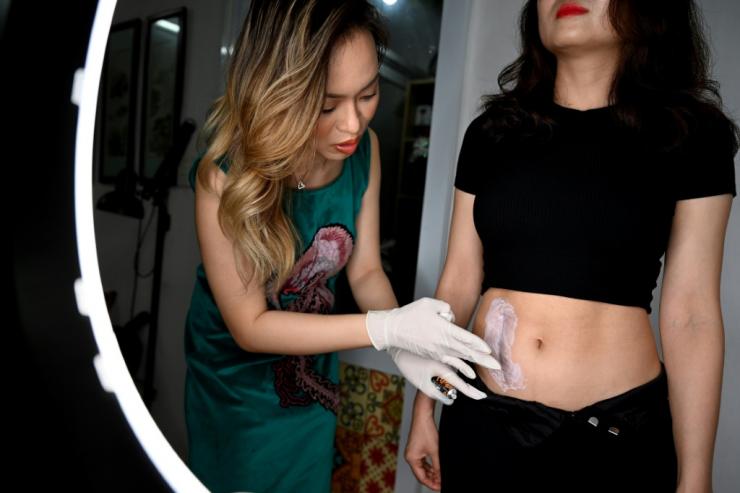
In her small Hanoi apartment, tattoo artist Ngoc inks a middle-aged woman whose life has been disrupted by divorce and illness. Each woman seeks healing through an art form that is still mostly taboo in Vietnam.
Attitudes have changed, but tattoos remain associated with communist broad-conservative country gangsters, prostitution, and underground criminals.
“I met a lot of women who said they liked tattoos, but they were born when no one supported tattoos,” Ngoc, who is called “Ngoc Like,” told AFP.
However, some have chosen to oppose those old ideas, seeing body art as a liberation from some of the strict social norms they have lived in.
Inking is often a milestone in the lives of these women, says Ngoc, 28.
“They have a personal desire to overcome the fear of social prejudice and renew themselves … to open a new chapter in life.”
Educated and business savy, Ngoc was ridiculed when she started as a tattoo artist less than a decade ago. Many thought she had no choice but to enter the industry.
But for high school teacher Tran Ha Nguyen, tattooing was a post-divorce celebration of her “conservative and solid” husband.
She chose a daisy design for her thighs. It’s so high that no one can see it unless you’re wearing a bikini.
Also, 46-year-old Nguyen Hong Tai, who recovered from trauma, put a rose tattoo on her stomach scar a few months after her husband died of lung cancer and said “forever in my heart” on her arm. I put in.
He always wanted her to be inked.
“He’s gone. He think I’d be stronger and I would have wanted to be the one I’ve always been with.”
“Tattoos gave me strength and confidence (to do it),” said the Thai with a big smile.
Ngoc has decided to focus its tattoo work on women with physical and mental injuries.
Demand is rising-her schedule is completely full, she says.
Her average monthly income per capita is less than $500, and her clients in Hanoi are often willing to spend twice as much on body art.
One of them, 33-year-old office worker Fong (not his real name) has been ashamed of her body since the appendicitis surgery left an “ugly” vertical scar 14 years ago.
“I thought about going to the clinic to see if they could get rid of the scars.
“But I wondered: why can’t I tattoo to hide it?”
Her eyes are anxious and tightly closed, Fong lies in a chair, waiting for the needle to begin marching across her midriff.
This is “not just beautification … the beauty here gives women the chance to be themselves,” says Ngoc.
A few hours later, when I looked in the mirror and saw a row of pink flowers behind her stomach, Fon’s face grinned.
“But the most important thing is that I live for myself. Life will be more interesting if I can lose the shame around the scars.”
Source: https://eminetra.com.au/vietnamese-women-find-healing-with-tattoos/147003/


















